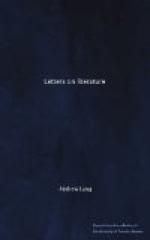In vain does Lucretius paint pictures of life and Nature so large, so glowing, so majestic that they remind us of nothing but the “Fete Champetre” of Giorgione, in the Louvre. All that life is a thing we must leave soon, and forever, and must be hopelessly lapped in an eternity of blind silence. “I shall let men see the certain end of all,” he cries; “then will they resist religion, and the threats of priests and prophets.” But this “certain end” is exactly what mortals do not desire to see. To this sleep they prefer even tenebras Orci, vastasque lacunas.
They will not be deprived of gods, “the friends of man, merciful gods, compassionate.” They will not turn from even a faint hope in those to the Lucretian deities in their endless and indifferent repose and divine “delight in immortal and peaceful life, far, far away from us and ours—life painless and fearless, needing nothing we can give, replete with its own wealth, unmoved by prayer and promise, untouched by anger.”
Do you remember that hymn, as one may call it, of Lucretius to Death, to Death which does not harm us. “For as we knew no hurt of old, in ages when the Carthaginian thronged against us in war, and the world was shaken with the shock of fight, and dubious hung the empire over all things mortal by sea and land, even so careless, so unmoved, shall we remain, in days when we shall no more exist, when the bond of body and soul that makes our life is broken. Then naught shall move us, nor wake a single sense, not though earth with sea be mingled, and sea with sky.” There is no hell, he cries, or, like Omar, he says, “Hell is the vision of a soul on fire.”
Your true Tityus, gnawed by the vulture, is only the slave of passion and of love; your true Sisyphus (like Lord Salisbury in Punch) is only the politician, striving always, never attaining; the stone rolls down again from the hill-crest, and thunders far along the plain.
Thus his philosophy, which gives him such a delightful sense of freedom, is rejected after all these years of trial by men. They feel that since those remotest days
“Quum Venus in silvis jungebat corpora amantum,”
they have travelled the long, the weary way Lucretius describes to little avail, if they may not keep their hopes and fears. Robbed of these we are robbed of all; it serves us nothing to have conquered the soil and fought the winds and waves, to have built cities, and tamed fire, if the world is to be “dispeopled of its dreams.” Better were the old life we started from, and dreams therewith, better the free days—
“Novitas
tum florida mundi
Pabula dia tulit, miseris mortablibus
ampla;”
than wealth or power, and neither hope nor fear, but one certain end of all before the eyes of all.
Thus the heart of man has answered, and will answer Lucretius, the noblest Roman poet, and the least beloved, who sought, at last, by his own hand, they say, the doom that Virgil waited for in the season appointed.




